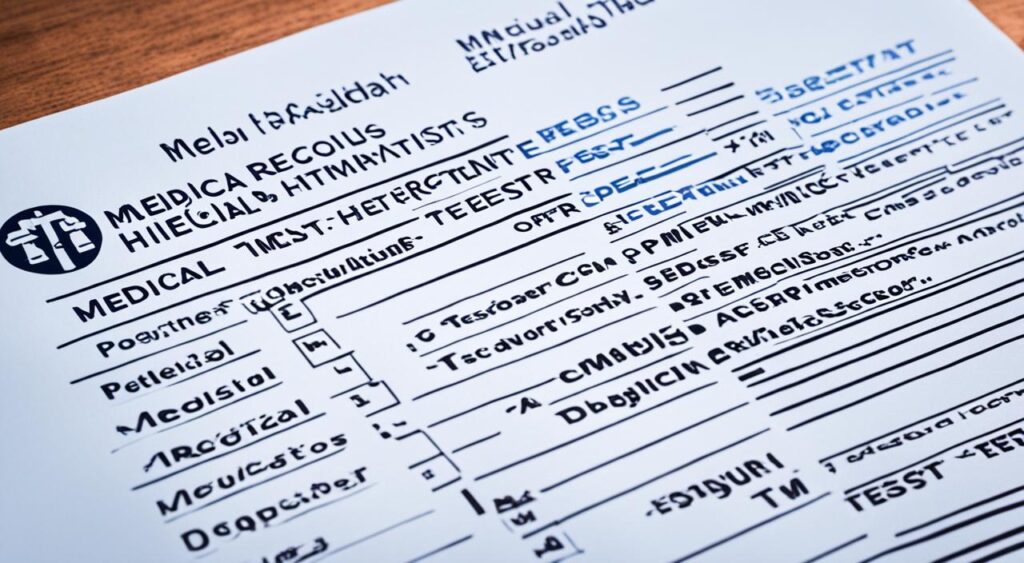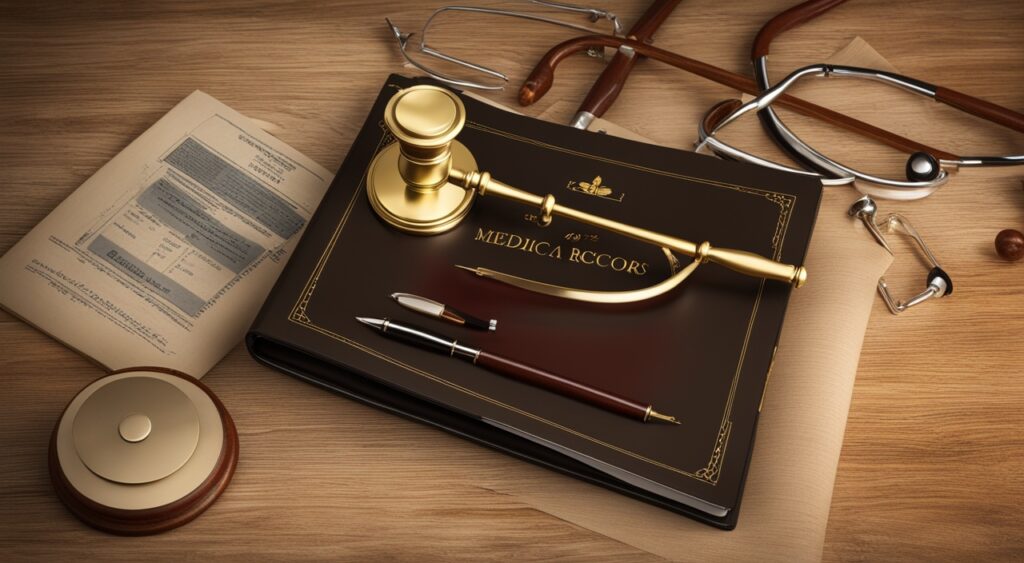In today’s world, keeping a precise medical record is crucial for many reasons. With how things are set up, the government looks at these records before deciding on payment. That’s why it’s key for providers to make sure the medical record is detailed and accurate. This helps in many ways, like making sure doctors talk effectively, reducing legal dangers, checking the quality of care given, and getting the right payment.
Having a clear, well-kept medical record is vital for giving patients the best care possible. It also ensures timely payments, lowers the risk of malpractice, and supports making treatment plans. The medical record isn’t just a tool for treatment; it’s also a legal and financial document that matters a lot for the patient and the healthcare provider.
Key Takeaways
- Proper documentation of a patient’s medical records is essential for effective healthcare delivery and reimbursement.
- Well-documented medical records facilitate communication among healthcare providers, reducing legal risks and ensuring appropriate reimbursement.
- Medical records capture value-based care metrics required by the government, such as Hospital Quality Indicators and MIPS measures.
- Accurate and timely medical record documentation is critical for providing quality patient care and mitigating malpractice risks.
- The medical record serves as a comprehensive account of a patient’s health history, clinical findings, and the care they have received.
Significance of Proper Medical Documentation
Keeping patient records well-documented is key in the healthcare world. It helps doctors and nurses share info easily. It also lowers the chance of legal problems, shows the quality of care, and helps with money matters.
Facilitates Communication Among Healthcare Providers
Having detailed patient records lets doctors get a clear picture of a person’s health. This leads to better treatments. It makes sure patients get consistent care and improves their health.
Mitigates Legal Risks and Liability Concerns
Patient records act as proof of the care given. They can cut down on lawsuits by showing doctors did their job well.
Captures Value-Based Care Metrics
Today, the government asks for reports on how well hospitals and doctors do. Good records are crucial for tracking and sharing this info. It shows how well healthcare places perform.
Ensures Appropriate Reimbursement
Clear patient records can speed up payments. They help avoid payment problems and make sure doctors get paid right for their work.
Components of Medical Records

Medical records are like a detailed story of a patient’s health. They include the patient’s history, test results, and what medicines they take. Healthcare workers use this information to give the best treatment.
Patient History and Demographics
This part has the patient’s basic details like their name and age. It also has their medical history. Knowing this helps doctors plan the right treatment.
Diagnoses and Treatment Plans
Doctors write down what they think is wrong and how to treat it here. This plan helps follow the patient’s progress and make sure they get better over time.
Test Results and Imaging
This section has the results of tests and images, like X-rays. It gives the doctor solid evidence to base their treatment choices on.
Prescriptions and Medication Records
Here, it lists all the medicines a patient needs, including how much and often. This guide makes sure the patient gets the right care safely.
Good medical records help doctors talk better, lower the chance of legal troubles, and understand the value of their care. Plus, it helps with getting payment right. Keeping detailed records is key to top-notch care.
Medical Records

Medical records are like a complete story of a patient’s health. They include everything from the past, tests, to the medicines they’ve taken. Healthcare providers find these records very helpful. They help them give the right treatment. Also, they’re more accurate than just remembering things.
These records give a lot of useful information and are key to your health. They answer any medical record related questions you might have about your health. Being able to see your medical records is an important right for patients. It’s part of how you own your medical records in the hospital and in the health care systems.
Benefits of Electronic Health Records (EHRs)

Electronic Health Records (EHRs) have changed how the healthcare field works. They have made managing medical records easier and more effective. Now, it’s simpler to store and find health information. This change has made doctors’ and nurses’ jobs easier, saving time and energy.
Streamlined Data Entry and Access
Healthcare providers can now make better decisions quickly. They can view a patient’s health history right on their screens. This has sped up the process of exchanging health information. In the past, finding and updating records was a slow, manual task.
Enhanced Research Capabilities
EHRs have unlocked new possibilities for research. With a vast amount of medical and health data available, comparison of records has become easier than ever. Researchers can look at the data to find what treatments work best. This leads to better care for patients.
Improved Patient Privacy and Security
Keeping patients’ health records safe is essential. Laws like HIPAA in the U.S. make sure this happens. They protect who can see your information and how it’s shared. As a result, patients can feel confident that their sensitive data is protected.
Legal and Ethical Considerations

Healthcare providers face many legal and ethical issues with medical records. They must keep patient info confidential and follow HIPAA rules. They also deal with giving patients access to their records and managing record ownership and storage.
Patient Confidentiality and HIPAA Compliance
It’s crucial for healthcare providers to keep patient data private and obey HIPAA. They usually need the patient’s OK to share medical records with others. But, they can share info without permission if it’s for the patient’s wellbeing.
Patient Access and Release of Records
Patients can ask for and get a copy of their medical records. Doctors must share these records if a patient asks in writing. Yet, they can say no if sharing the info might hurt the patient.
Ownership and Retention of Medical Records
Healthcare providers own medical records, not the patients. They must follow laws about keeping records for a certain time. This info doesn’t go away, even if the patient asks for their own copy.
Best Practices in Medical Record Management
To manage medical records well, healthcare providers need to follow top industry standards. They should aim to keep records accurate and complete. It’s also crucial to document everything on time and store records properly for easy access.
Accuracy and Completeness
It’s important to fill in every line in a medical record to avoid someone changing information. If a mistake happens, just cross it out. This keeps the records reliable and easy to follow. Providers must record everything important, like a patient’s history, diagnoses, treatments, test results, and medications.
Timely Documentation
Recording information quickly is key to keeping patient care lines clear and current. Healthcare workers should document right after seeing a patient or a clinical event. Quick notes avoid forgetting details or making mistakes, which could cause problems later.
Proper Storage and Retrieval
Computerizing records makes finding them fast and easy. Medical files online should be safe and only accessible by the right people. Some documents, like discharge notes and referrals, patients should always be able to get. This ensures they can see their history and share it with other providers.
Following these practices helps keep records right, complete, and easy to get. This is key for good patient care, meeting the law, and handling record requests from patients or parties involved in their care.
Challenges and Pitfalls in Record Keeping
Proper medical record keeping is crucial, but it’s not without its hurdles. Healthcare providers deal with problems like a lack of rules, making mistakes, and keeping patient info safe. These are big issues.
Lack of Standardization
The way medical records are kept is all over the place. Different places do it their own way, making things messy. This mess can lead to mistakes and gaps in the patient’s information. Having set rules that everyone follows is a must to keep records reliable.
Human Error and Omissions
Medical record keeping is detailed work. Mistakes like bad handwriting and missed data can happen easily. These mistakes make the record less accurate. This can impact the care a patient gets and might even put the provider at risk.
Data Security and Breaches
Medical data is valuable but also a big target for hackers. If the data isn’t kept safe, it could be harmful. It could break patient’s trust and cause legal problems for the providers.
In places like India, the situation with medical records is even more challenging. Many people’s basic healthcare needs are still not met. These areas need more help to improve how they handle and keep medical records.
The Future of Medical Records
The healthcare field is changing fast. Medical records are set to change a lot. We’ll see big improvements in interoperability and data exchange. This means patient info can move easily between healthcare places. This change will let doctors see full medical stories, no matter where care was given. It will make care better for everyone.
Interoperability and Data Exchange
It’s crucial that medical records can move between doctors, drug stores, and patients securely. Thanks to things like the federal Health Insurance Portability and Accountability Act (HIPAA), and state level laws, it’s getting easier. These rules help you see your records and share them with other doctors. This hands power back to patients to own their mental health records and access to your records.
Artificial Intelligence and Machine Learning
Artificial intelligence (AI) and machine learning (ML) will change how we manage medical records. These smart systems will improve looking at data, making decisions, and managing patient data. AI tools can find patterns, spot weird things, and help doctors better take care of people. This will boost care quality and how fast it’s given.
Patient-Centric Data Management
Putting patients at the center of data management is getting much more important. Patients will get to their records easier through forms online and portals. This new way lets people be more in control of their care and choices. It will also make a stronger team between patients and their doctors, which is great for everyone’s health.
Also Read: How Can Patient Care Be Made More Efficient?
Conclusion
Medical records are key in the changing world of healthcare. They document a person’s health over time. This includes tests, results, and treatments they’ve had. Managing these records well is crucial. It helps doctors share information easily, decreases legal risks, and tracks how good the care is. Also, it ensures the right payments.
The future of medical records is bright. New technologies like better data storage, smarter data exchange, and AI are coming. These will let people be more involved in their own care. They will also help improve how patients get better.
Still, there are issues like different record styles, mistakes, and keeping data safe. Everyone in healthcare must work together to fix these. They need strong rules to keep records safe and right. This way, we can use medical records to their best. They will help both patients and doctors choose the best care possible.
FAQs
Q: Why should you request your medical records?
A: Requesting your medical records allows you to have a comprehensive view of your medical history, which can be crucial for coordinating your healthcare and ensuring accurate treatment.
Q: How can you request for medical records?
A: You can request for medical records by submitting a written request to your healthcare provider, following the guidelines outlined by HIPAA.
Q: What is the process to get your medical records?
A: To get your medical records, you need to fill out an authorization form provided by your healthcare provider and follow their specific procedures for record release.
Q: Who owns your medical records?
A: The ownership of medical records typically belongs to the healthcare provider or facility that created them, but patients have the right to access and request copies of their own records.
Q: How can you ensure the confidentiality of your medical records?
A: You can ensure the confidentiality of your medical records by only sharing them with authorized individuals and using secure methods for storing and transmitting the information.
Q: Can you get your mental health records as easily as your other medical records?
A: Mental health records may have additional privacy protections, but you still have the right to request and access them like any other medical records.
Q: What information can you find in your medical records?
A: Your medical records typically include details of your medical history, treatments, medications, test results, and other relevant healthcare information.
Source Links
- https://www.nlm.nih.gov/oet/ed/stats/03-200.html
- https://www.scphealth.com/providers/blog/think-with-your-ink-4-reasons-why-proper-medical-record-documentation-is-vital
- https://www.ncbi.nlm.nih.gov/pmc/articles/PMC3238553/





